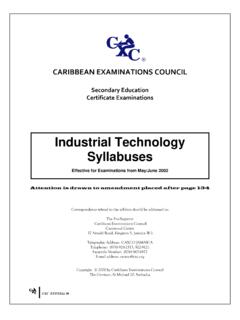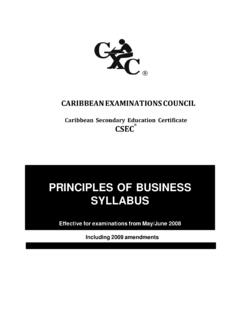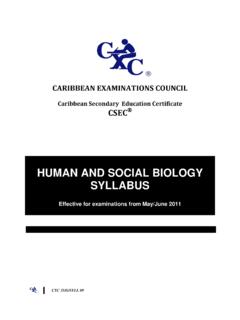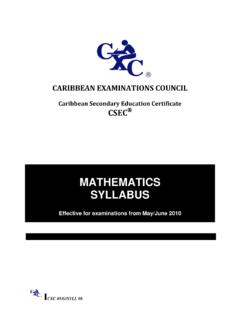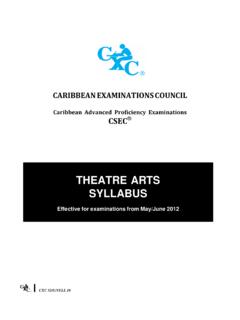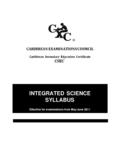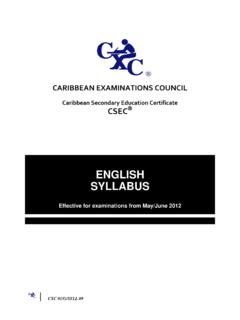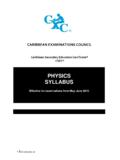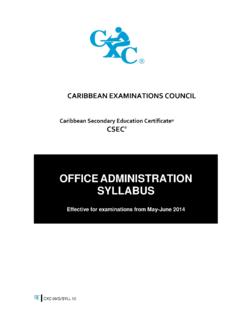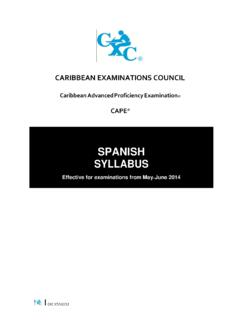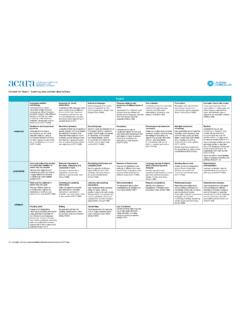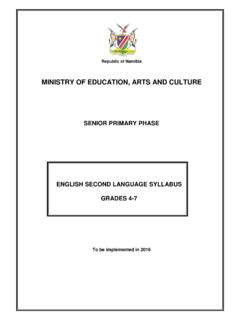Transcription of CARIBBEAN EXAMINATIONS COUNCIL
1 CARIBBEAN EXAMINATIONS COUNCIL CARIBBEAN Secondary Education Certificate CSEC ENGLISH SYLLABUS Effective for EXAMINATIONS from May/June 2012 CXC 01/G/SYLL 09 Published by the CARIBBEAN EXAMINATIONS COUNCIL 2010, CARIBBEAN EXAMINATIONS COUNCIL All rights reserved. No part of this publication may be reproduced, stored in a retrieval system, or transmitted in any form, or by any means electronic, photocopying, recording or otherwise without prior permission of the author or publisher. Correspondence related to the syllabus should be addressed to: The Pro-Registrar CARIBBEAN EXAMINATIONS COUNCIL Caenwood Centre 37 Arnold Road, Kingston 5, Jamaica, Telephone: (876) 630-5200 Facsimile Number: (876) 967-4972 E-mail address: Website: Copyright 2009, by CARIBBEAN EXAMINATIONS COUNCIL The Garrison, St Michael BB14038, Barbados CXC 01/G/SYLL 09 Content RATIONALE.
2 1 AIMS .. 1 SKILLS AND ABILITIES TO BE ASSESSED .. 2 RECOMMENDED TIME ALLOCATION .. 4 ENGLISH A AND B - NOTES AND SUGGESTED ACTIVITIES .. 5 THE ENGLISH A EXAMINATION .. 18 - OUTLINE OF ASSESSMENT: ENGLISH A THE ENGLISH B EXAMINATION .. 22 - OUTLINE OF ASSESSMENT: ENGLISH B PRESCRIBED TEXTS FOR ENGLISH B .. 29 SUGGESTED READING LIST FOR ENGLISH .. 32 GLOSSARY .. 57 CXC 01/G/SYLL 09 AMENDMENTS ARE INDICATED BY ITALICS REVISED 1997, 2003 AND 2009 Please check the website, for updates on CXC s syllabuses CXC 01/G/SYLL 09 English Syllabus RATIONALE The ability of students to understand fully what they listen to, read and view as well as to express themselves clearly in speech and in writing are critical factors in managing their personal and social well-being.
3 The study of language and literature provides opportunity for students to develop competence and confidence in speaking and writing for personal and public purposes in everyday activities. It also seeks to develop students' ability to read and enjoy literary texts, to explore social and moral issues, and to evaluate the way language grows, develops and is used. The study of language and literature also recognises the dynamics of viewing and valuing as students respond critically to the wealth of electronic media which help to shape our perceptions at conscious and unconscious levels. Students explore receptively and expressively three major literary genres, Drama, Poetry, and Prose Fiction, in order to become aware of the many functions and purposes of language .
4 In doing so, they discover that the five facets of the language arts, namely, listening, speaking, reading, writing and viewing, are closely linked together and are interdependent. Syllabus objectives are organised under understanding and expression in order to guide curriculum development, to give meaning to the teaching programme and to define an assessment scheme that reinforces an English syllabus which has been conceived as an integrated approach to language teaching. This enables students to appreciate the holistic nature of language learning. The English syllabus is organised for examination as English A and English B.
5 The former emphasises the development of students oral and written language skills among students through a variety of strategies. The latter provides opportunities for students to explore and respond critically to specific literary texts as they observe and appreciate the author s craft. AIMS The syllabus aims to: 1. develop the ability to use the spoken and written language , CARIBBEAN Standard English (CSE), with precision, clarity and grammatical correctness; 2. develop the ability to use, understand and respond to spoken and written CARIBBEAN Standard English; 3. develop the ability to use language effectively for communicating in a variety of contexts: social, academic and professional; 4.
6 Develop the ability to give effective articulation to experience (real or imagined); CXC 01/G/SYLL 09 1 5. promote in students a willingness and ability to inform themselves about, and to contribute reasoned opinions on social issues; 6. promote a lasting appreciation of the diversity of purposes for which language varieties are used; 7. promote an understanding and appreciation of the place and value of the varieties of English and of the dialects and creoles of the CARIBBEAN and other regions in different social and cultural contexts; 8. develop a critical awareness of the language devices used to persuade; 9. develop an ability to respond to literature for pleasure, to recognise and respond to the writer s craft, and to make sensitive appraisals of value judgments and other concepts expressed in literature; 10.
7 Develop knowledge of the various sources of information and a desire to use these for the student s own enlightenment; while recognising the importance of acknowledging the contribution of such sources to their own ideas; 11. develop the capacity to assess the reliability of sources including those available on the Internet. SKILLS AND ABILITIES TO BE ASSESSED The aims stated above can be attained by developing the related skills in the student. These skills are categorised under the two broad headings: Understanding, the decoding and interpreting of messages through the analysis of the language structures and devices used in any given context, and Expression, the conveying of meaning through the selection of language structures and devices appropriate to each specific context.
8 Performance will be reported under the profile dimensions Understanding and Expression. 1. Understanding The ability to: (a) understand meaning conveyed (both in listening and in reading) through word choice and grammar, and (in reading) through punctuation and paragraphing; (b) obtain information accurately, as demonstrated in the ability to: (i) recognise facts stated explicitly; (ii) extract specific information from what is read or heard; (iii) extract implied information; (iv) identify stated or implied time sequence; (v) draw valid conclusions and inferences from information presented; (vi) recognise cause and effect relationships; (vii) identify main and subordinate ideas and trace their development.
9 CXC 01/G/SYLL 09 2 (viii) recognise the difference between denotative and connotative language ; (ix) treat with passages whose main purpose is informative (expository) as opposed to literary or persuasive; (x) interpret and respond to tables and pictorial communication, such as diagrams, conventional signs and symbols; (c) grasp insights from reading literature and demonstrating the ability to: (i) deduce reasons and motives for particular spoken and written communication (other than those with an overt persuasive intent); (ii) appreciate the appropriateness of different uses of tone, mood, register, code and style in talks and speeches, in non- literary forms including scientific or technical writing, and in literary forms (prose, verse and drama), in relation to the author s intention; (iii) detect connotations in the use of words and in the presentation of ideas and distinguish between connotative and denotative meaning; (iv) detect and assess the apt use of devices such as pun, innuendo, exaggeration, irony and symbolism.
10 (v) recognise and respond to the appropriateness of the means, including form and structure, used by a speaker, director or author to achieve the intended effect of a talk or speech, letter, article or essay, poem, novel, story or play; (vi) visualise the situation, attitudes, mood and setting of a play and appreciate how they influence the actions and interaction of actors in the performance of that play; (vii) recognise implicit themes; (viii) respond to West Indian and other literature in English (novels, short stories, poems and plays): recognise elements of the writer s craft; respond to writers evocation of feelings, moods, atmosphere; making critical appraisal of values and concepts expressed in literature, and relate these to everyday living; (d) recognise and evaluate opinion expressed in various forms as demonstrated in the ability to: (i) distinguish factual statements from unsupported opinion statements; (ii) detect connotations in the use of words and the presentation of ideas; (iii) evaluate the effectiveness of language devices used to persuade; (iv) recognise the range of techniques of persuasion employed in social intercourse and in the mass media, and assess the persuasive effects.
